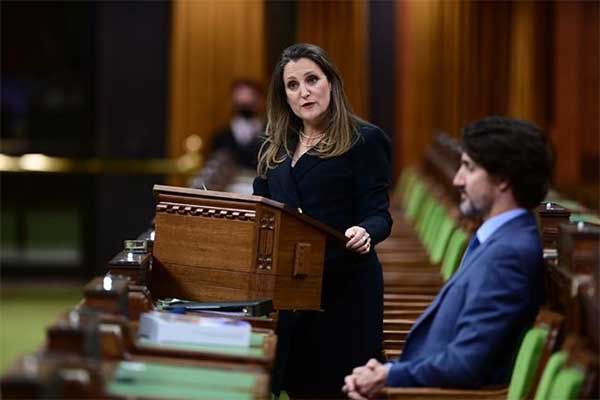Canada’s federal government unveiled its first budget in more than two years.
The budget represents a strong effort to reduce Canada’s per capita greenhouse gas emissions. It adds an additional $101.4 billion dollars in new spending—much of which is geared towards economic stimulus— to get Canada through the Covid-19 pandemic.
The budget allots $17.6 billion to green projects, which Finance Minister Chrystia Freeland says “will help reduce greenhouse gas emissions by 36% by 2030″—as opposed to the original target of 30%.
While pvbuzz still has to review the fine print details the budget, one thing is clear; the Liberals intend to achieve emission reductions of 40% or more by 2030.
To achieve this, the government boosting clean growth by developing industry for energy-efficient retrofits, including the development of a Canadian supply chain for high-efficiency home renovation products. They will allocate 5 billion over 7 years on a Net Zero Accelerator program to invest in projects used by industry to reduce greenhouse gas emissions.
Furthermore, companies manufacturing zero-emissions technologies, such as solar panels and electric buses will receive an extremely generous 50% 10-year reduction on corporate and small business income tax rates.
In order to help homeowners reduce their energy bills, the budget allocates $4.4 billion over 5 years for residential and commercial energy retrofits.
The government says it’ll work with the Canada Mortgage and Housing Corporation (CMHC) to make available interest-free loans of up to $40,000 to households for green retrofits—such as high-efficiency doors or windows and rooftop solar panels (see page 177 of the 2021 budget).
These loans would be available to homeowners and landlords who undertake retrofits identified through an authorized EnerGuide energy assessment.
The government says this would help eligible participants make deeper, more costly retrofits that have the biggest impact in reducing a home’s environmental footprint and energy bills.
This budget represents Canada’s strongest effort to date towards mitigating and adapting to climate change—with all levels of the economy including small, medium, and large-scale businesses, in addition to residential properties—being targeted with environmentally friendly support.
There is no doubt that the combination of a generous cleantech tax cut and funding for residential and commercial retrofits is amazing news for Canada’s burgeoning green industry sector.
—
Article written by Brett Porter, Content Contributor
Edited for publication by Derick Lila, Managing Editor













Comments